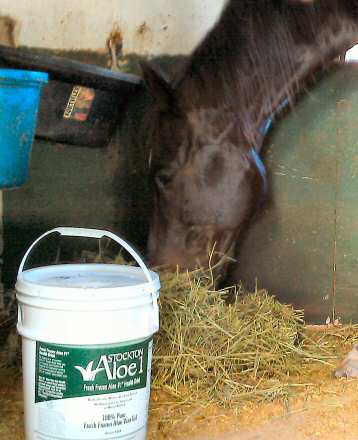
Aloe Vera for Equine Post Viral Lethargy Syndrome
Equine Post Viral Lethargy Syndrome (PVLS) is the equivalent to Chronic Fatigue Syndrome for horses. PVLS was recognized as a clinical diagnosis in the 1980’s when a large number of horses experienced symptoms of lethargy. Racehorses were increasingly visiting veterinarians with overall fatigue and lack of exercise stamina and endurance. Though visibly in discomfort and unable to perform their work, the equines had no measurable signs of disease. The only consistent abnormalities were decreased levels of white blood cells, enlarged lymph nodes and low body temperatures.
PVLS is common in horses over six years of age, but affects male and females equally. Horses may regain strength if given time to rest, but if left untreated, they may become recumbent and paralyzed. In this event, the ending result would be to put the animal to sleep.
Conventional drug therapies, including hyper immune serum injections, have a 40% success rate, according to David Urch in his book, “Aloe Vera Nature’s Gift—Aloe in Veterinary Practice.”
Urch’s book and research provides veterinarians and animal owners with practical, daily advice on how to use the natural remedy of aloe vera for a vast array of animal ailments. His study of PVLS in horses is in response to an article published in the Veterinary Times by Peter Green. Green had great success by treating horses suffering from PVLS with 240 milliliters of aloe vera every day for three to five weeks. The most effective way to administer aloe vera treatments is by mixing the juice with the horse’s food.
“After reading the article, I started to treat these cases in the same way,” said Urch. “Over a number of years I have treated hundreds of cases of PVLS using aloe vera, achieving a success rate of 83%. The cost of this treatment has been approximately half that of traditional drug therapy.”
Aloe vera contains essential vitamins and minerals that are shown to boost energy and stimulate the immune system. These natural properties may be a great benefit to horses dealing with the debilitating symptoms of PVLS. Aloe vera also contains 22 amino acids, the building blocks of protein, which help horse’s to rebuild their strength.
“Athletes report that regular intake of aloe vera reduces competitive stress and post-event fatigue, increasing stamina and performance,” reported equestrianmag.com. Before integrating aloe vera into a horse care regime, animal owners should always consult with their veterinarian.
Resources:
David Urch, “Aloe Vera Nature’s Gift—Aloe in Veterinary Practice”
www.aloeresearch.com
Aloe Vera extracts in equine clinical practice. Green, Peter. Veterinary Times, Vol. 26 No. 9, Sept. 1996.
www.equestrianmag.com